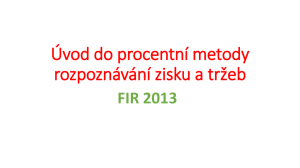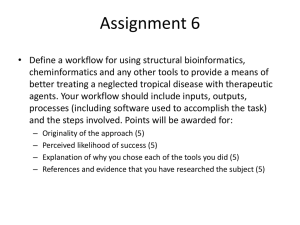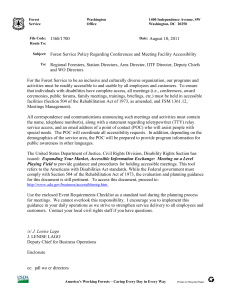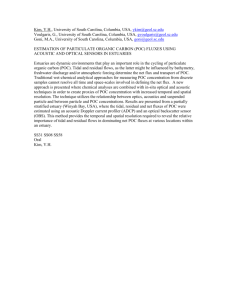Software + Services for Engineers.
advertisement
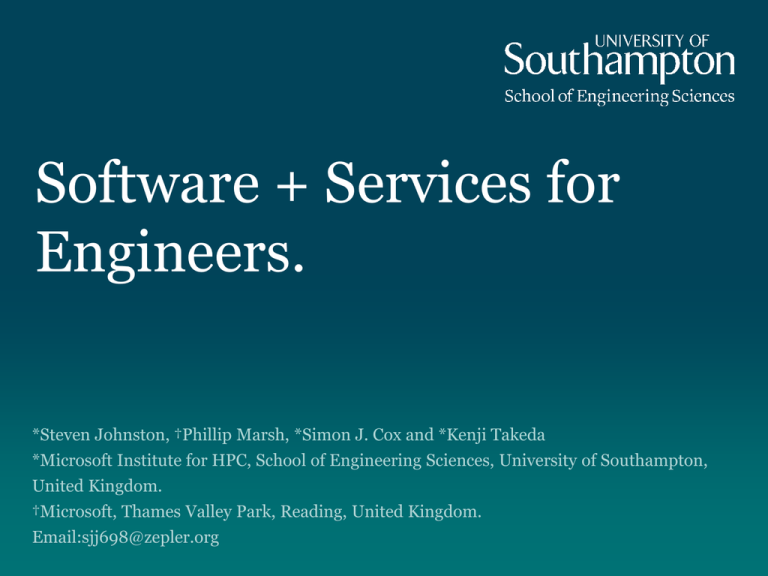
Software + Services for Engineers. *Steven Johnston, †Phillip Marsh, *Simon J. Cox and *Kenji Takeda *Microsoft Institute for HPC, School of Engineering Sciences, University of Southampton, United Kingdom. †Microsoft, Thames Valley Park, Reading, United Kingdom. Email:sjj698@zepler.org Microsoft Institute for High Performance Computing @ Southampton Dr Kenji Takeda & Prof Simon Cox “Our aim is to demonstrate why, where, and how we are exploiting current and future Microsoft tools and technologies to make the engineering design process faster, cheaper and better.” www.mihpc.net Centre for Fluid Mechanics Simulation • “To develop means to dramatically increase simulation power, revolutionise the design process and transform user interface in order to provide tools to exploit multi-disciplinary optimisation and so bring products to market in extremely short timescales” • Consortium includes: Airbus, ARA, Rolls-Royce, BAE Systems, BMT Fluid Mechanics, MBDA, and WilliamsF1… • University of Southampton, School of Engineering Sciences will develop proof of concepts with Airbus, Rolls-Royce and BAE Systems developed between showing how “…current and future Microsoft tools, technologies and platforms can be exploited to make the engineering design process faster, cheaper and better.” Overview • Introduction • Software + Services • User driven Proof of Concepts (PoC) – Rolls Royce – Airbus – BAE • Q&A Introduction Objectives • Accelerate the understanding of engineering systems and product development • Investigate the enterprise engineering process • Separate infrastructure from engineering Using user-driven Proof of Concepts (PoC) Software + Services • Fat client or thin Client • Local or mobile or cloud application • S+S is a hybrid of designs – REST – SOA – SaaS – Web 2.0 Rolls Royce PoC • Formalise the engineering design and optimisation process (currently script based) • Orchestration of computationally intensive Gas Turbine blade simulation • Key Technologies – Windows Workflow Foundation – Windows HPC Server (v1) – Visual Studio 2005 Authoring Workflow (WWF) Visual Studio Workflow Services Compute resources State Execution Compute Cluster Services (CCS) Runtime Tracking Activities Persistence Monitor Compute Custom Interface Reporting Local machine GUI Linux Cluster Web Browser Custom Interface MS SQL MS SQL MS SQL MS SQL Workflow Workflow Workflow Workflow persistence templates execution tracking Rolls Royce PoC -Features • Workflow – Reusability – Quality assurance – Separation of WF user and WF creator – Tracking (Data provenience or monitoring) • Interoperability between Windows and Linux • Demonstrated applicability of commodity technologies to challenging engineering problems Airbus PoC • Data Intensive collaborative working across multiple sites • Business objects Model -> Mesh -> Flow solution • Key Technologies – Sharepoint Server – Windows Communication Foundation (WCF) Airbus PoC - Features • LDAP/AD user credentials • Interoperability with existing systems (Python client) • Robust, reliable and scalable (multi-site) • Demonstrated considerable simplification and consolidation of technology stack using Microsoft technologies BAE PoC • How to capture and retain knowledge • Provide an audit trail and thought process • How to introduce new engineers to ongoing work Key Technologies (mostly Beta & RC) – Windows Server 2008 – HyperV RC0 – Windows HPC Server 2008 Beta 2 – SQL Server 2008 CTP6 – Office Communication Server BAE PoC - Features • Custom client – Start tasks – Associate documents/files/chats/workflows with task – Full text search • Virtualised infrastructure (Hyper-V) • Knowledge capture (automatic OCS chat saving) • Multiple data format search ( Ifilter in SQL server) • File streaming (SQL managed data files) Summary • Each PoC addresses a different area of the enterprise engineering process • Demonstrated technology capabilities • Each PoC is a general case and the solutions applicable to other domains • By separating audit and infrastructure, workers can focus on their expert areas Questions? *Steven Johnston, †Phillip Marsh, *Simon J. Cox and *Kenji Takeda *Microsoft Institute for HPC, School of Engineering Sciences, University of Southampton, United Kingdom. †Microsoft, Thames Valley Park, Reading, United Kingdom. Email:sjj698@zepler.org

